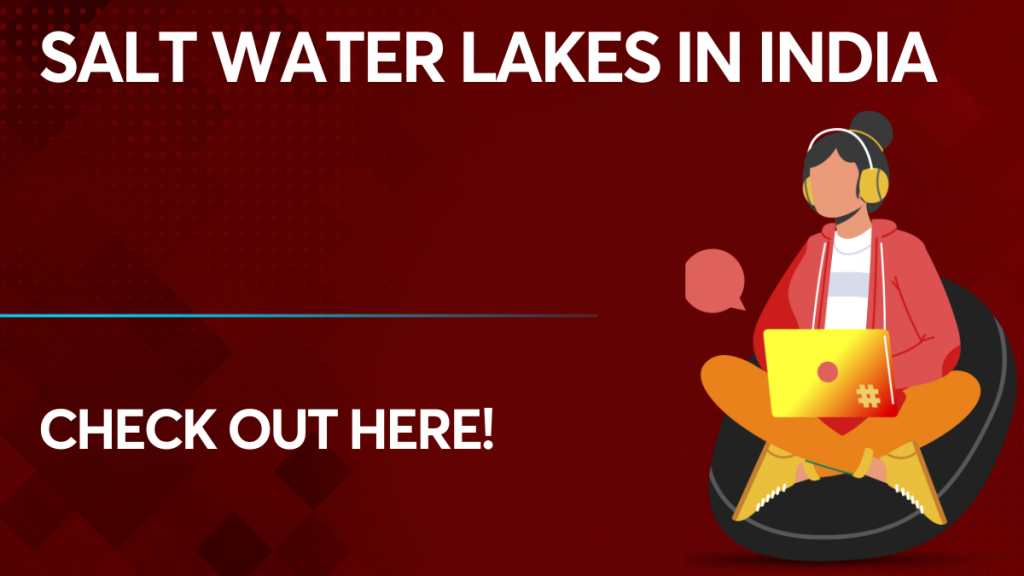India is home to several saltwater lakes, which are bodies of water with a high salt concentration and other minerals. These lakes are often formed in arid or semi-arid climates, where evaporation rates are high and water sources are scarce.
You can check the all information related to Saltwater lakes in India here!
List of Saltwater lakes in India:
The list of Freshwater lakes in India are:
| Lake Name | State | Area (km²) | Notes |
|---|---|---|---|
| Chilika | Odisha | 1,100 | Largest saltwater lake in India |
| Pulicat | Andhra Pradesh/Tamil Nadu | 500 | Second-largest saltwater lake in India |
| Sambhar | Rajasthan | 190 | Largest inland saltwater lake in India |
| Kolleru | Andhra Pradesh | 245 | Important habitat for migratory birds |
| Loktak | Manipur | 287 | Only floating national park in the world |
| Khari | Rajasthan | 19 | Located in the Thar Desert |
| Pachpadra | Rajasthan | 15 | Contains large deposits of minerals |
| Narayan Sarovar | Gujarat | 4.4 | Sacred lake for Hindus, Muslims, and Sikhs |
The biggest saltwater lake in India:
The biggest saltwater lake in India is Chilika Lake, which is located in the state of Odisha. It covers an area of approximately 1,100 square kilometres and is also the second-largest lagoon in the world.
Significance of saltwater lakes in India:
here are some of the significant roles and benefits of saltwater lakes in India presented in tabular form:
| Significance | Explanation |
|---|---|
| Biodiversity and habitats | Saltwater lakes provide crucial habitats for a wide variety of plant and animal species, including several rare and endangered species. They also support important fishery resources for local communities. |
| Tourism and recreation | Many saltwater lakes in India, such as Chilika and Pulicat, are popular tourist destinations, attracting visitors for activities such as bird watching, boating, and fishing. |
| Cultural significance | Some saltwater lakes, such as Narayan Sarovar in Gujarat, have cultural and religious significance for local communities, serving as pilgrimage sites and important centres of worship. |
| Salt production | Saltwater lakes are often sources of salt production, which can be an important economic activity in arid and semi-arid regions where other sources of fresh water are scarce. |
| Climate regulation | Saltwater lakes can help regulate the local climate by moderating temperatures and influencing weather patterns, helping to maintain ecological balance in the surrounding area. |
Measures to protect saltwater lakes in India:
here are some measures for the protection of saltwater lakes in India, presented in tabular form:
| Measure | Explanation |
|---|---|
| Watershed management | Protecting the catchment areas around saltwater lakes through measures such as afforestation, soil conservation, and rainwater harvesting can help reduce erosion and sedimentation, which can degrade water quality and harm aquatic ecosystems. |
| Waste management | Proper management of municipal and industrial waste can help prevent pollution of saltwater lakes, reducing the risk of contamination and the spread of diseases. |
| Regulation of fishing and boating activities | Fishing and boating activities can have significant impacts on saltwater lake ecosystems, such as overfishing and habitat destruction. Regulation and enforcement of rules and regulations can help mitigate these impacts and promote sustainable use of resources. |
| Conservation of biodiversity | Protecting the biodiversity and habitats within and around saltwater lakes is critical to their ecological health and functioning. This can be achieved through measures such as the establishment of protected areas, habitat restoration, and species conservation programs. |
| Public awareness and education | Educating local communities, visitors, and stakeholders about the value and importance of saltwater lakes can help build public support for conservation efforts and promote sustainable use practices. |
Saltwater lakes in India: FAQs
Some examples of saltwater lakes in India include Chilika Lake, Pulicat Lake, and Sambhar Lake.
Saltwater lakes in India have significant ecological and many more!. You can check the above article.
Measures to protect saltwater lakes in India including watershed management are provided above. You can check in above article!
The biggest saltwater lake in India is Chilika Lake, which covers an area of approximately 1,100 square kilometres and is located in the state of Odisha.
Sure!You can check out the above article!
